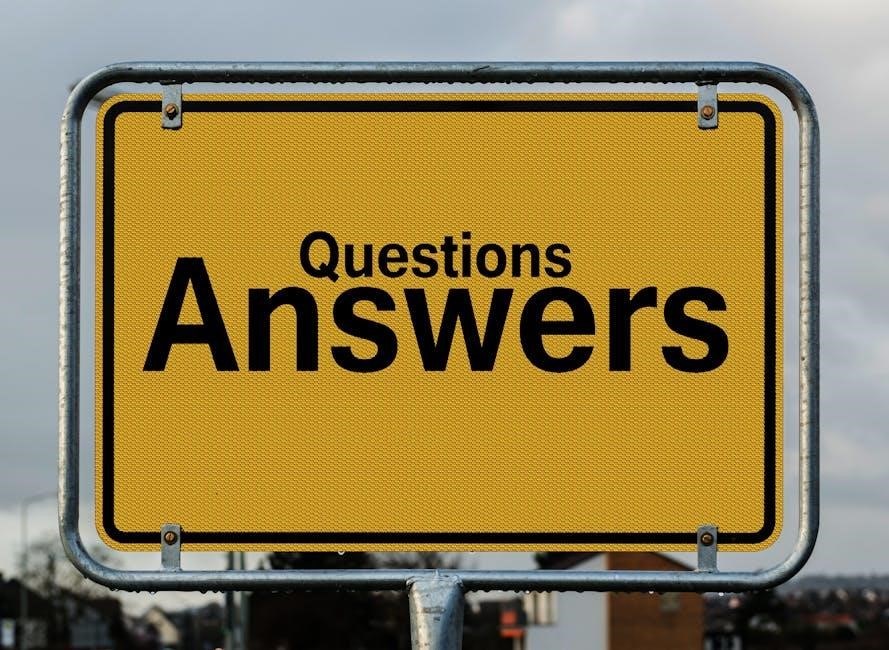security guard exam questions and answers pdf
The Security Guard Exam Questions and Answers PDF is a vital resource for preparation, offering multiple-choice and scenario-based questions covering legal definitions, emergency procedures, and more․
1․1 Importance of Preparation
Proper preparation is essential for success in the security guard exam․ Understanding the exam format and content ensures candidates are well-equipped to handle multiple-choice, true/false, and scenario-based questions․ Preparation helps in mastering legal definitions, emergency procedures, and security protocols․ Reviewing study materials and practicing with mock exams builds confidence and reduces exam anxiety․ Adequate preparation ensures a strong foundation in security best practices, enabling candidates to perform effectively in real-world scenarios and excel in their roles as security professionals․
1․2 Overview of the Exam Format
The security guard exam typically consists of multiple-choice and true/false questions, with some scenario-based queries․ Candidates are usually required to answer around 60-70 questions within a set time frame, often 60-90 minutes․ The exam assesses knowledge of legal definitions, emergency procedures, and security protocols․ Understanding the format helps candidates allocate time effectively and prioritize challenging sections․ Familiarity with the structure ensures a smooth experience, allowing candidates to demonstrate their expertise confidently and efficiently during the test․

Types of Questions in the Security Guard Exam
The exam includes multiple-choice questions, true/false questions, and scenario-based questions, designed to assess knowledge of legal definitions, emergency response, and security protocols effectively․
2․1 Multiple Choice Questions
Multiple-choice questions are a core component of the security guard exam, testing candidates’ knowledge on legal definitions, emergency procedures, and security protocols․ These questions present several options, with only one correct answer․ They cover essential topics like accident prevention, evidence handling, and professional conduct․ For example, a question might ask about the proper procedure during an arrest or detainment․ Correct answers demonstrate a clear understanding of security practices and legal standards, ensuring candidates are prepared for real-world scenarios․ These questions are designed to assess both theoretical knowledge and practical application effectively․
2․2 True/False Questions
True/False questions in the security guard exam assess knowledge on key concepts, requiring candidates to determine the accuracy of statements․ These questions cover legal definitions, emergency procedures, and security protocols․ For instance, a question might state, “A security guard can legally search a detained individual․” Candidates must answer correctly based on their understanding of legal standards․ These questions are straightforward but demand precise knowledge to avoid errors․ They ensure a strong grasp of critical security principles and practices․
2․3 Scenario-Based Questions
Scenario-based questions test a candidate’s ability to apply knowledge in real-life situations․ These questions present hypothetical incidents, such as handling an emergency or de-escalating a conflict․ Candidates must choose the most appropriate response based on security protocols and legal standards․ These questions evaluate critical thinking, decision-making, and practical understanding of security procedures․ They are designed to ensure that guards can effectively manage challenging situations while adhering to professional guidelines and ethical practices․ This format prepares candidates for real-world scenarios they may encounter on the job․ Mastering these questions is crucial for exam success and professional competence․

Popular Topics Covered in the Exam
The exam covers essential topics such as legal definitions, emergency response procedures, and security protocols, ensuring guards are well-prepared for real-world scenarios and professional responsibilities․
3․1 Legal Definitions and Terminology
Understanding legal definitions and terminology is crucial for security guards․ The exam includes questions on powers of arrest, search and seizure, use of force, and legal responsibilities․ Candidates must familiarize themselves with terms like “reasonable suspicion,” “probable cause,” and “private property rights․” Knowledge of local laws and regulations, such as trespassing statutes and liability protections, is also essential․ Mastery of these concepts ensures compliance and professionalism in security operations․
3․2 Emergency Procedures and Response
Emergency procedures and response are critical components of the exam․ Questions cover protocols for fire evacuation, medical emergencies, and natural disasters․ Candidates must understand first aid basics, communication during crises, and coordination with authorities․ Knowledge of alarm systems, emergency exits, and incident reporting is also tested․ Proper response techniques ensure safety and minimize risks, making this section vital for effective security operations and community protection․
3․3 Security Protocols and Best Practices
Security protocols and best practices are essential for maintaining order and safety․ Questions address access control, surveillance, and incident reporting․ Proper patrolling techniques, communication strategies, and teamwork are emphasized․ Understanding these protocols helps guards prevent unauthorized access, respond to threats, and ensure compliance with regulations․ Effective implementation of these practices is crucial for safeguarding assets and upholding professionalism in the security field․

Study Materials and Resources
This section explores essential study materials, including PDF guides, online practice tests, and recommended textbooks, to aid in effective, comprehensive exam preparation․
4․1 Best PDF Guides for Exam Preparation
The best PDF guides for security guard exam preparation include comprehensive resources like “The Unarmed Security Guard Exam Prep Guide” and “Security Valuation MGT 3075․” These guides offer detailed study materials, covering legal definitions, emergency procedures, and security protocols․ They also feature multiple-choice questions and scenario-based problems to simulate real exam conditions․ Such PDFs are invaluable for understanding complex topics and ensuring thorough preparation for the licensing exam․
4․2 Online Practice Tests and Mock Exams
Online practice tests and mock exams are essential tools for exam preparation․ They provide realistic simulations of the actual test, featuring multiple-choice and scenario-based questions․ Platforms offer immediate feedback, helping candidates identify weak areas․ Timed conditions mimic exam pressure, improving time management skills․ Many resources, such as Ontario Security Guard Licence practice tests, align with official curriculums, ensuring relevance and effectiveness․ These tools are ideal for self-assessment and building confidence before the final exam․
4․3 Recommended Textbooks and Manuals
Several textbooks and manuals are highly recommended for security guard exam preparation․ Titles like “Security Guard Exam Prep Guide” and “The Complete Security Officer’s Manual” provide comprehensive coverage of legal definitions, emergency procedures, and security protocols․ These resources often include practice questions, scenario-based exercises, and detailed explanations․ Updated editions ensure alignment with current laws and standards․ Candidates can find these materials in PDF format or hard copy, available through official websites, online retailers, or training institutions․

Common Challenges in the Exam
The exam presents challenges like multiple-choice and scenario-based questions, requiring strong understanding and time management skills, essential for effective preparation and success․
5․1 Time Management Strategies
Effective time management is crucial for success in the security guard exam․ Allocate a set amount of time for each question to avoid spending too long on one․ Practice with timed mock exams to build speed and accuracy․ Prioritize answering easier questions first to secure partial marks․ Skip complex scenarios temporarily and return to them after completing simpler ones․ Utilize practice tests to refine pacing and ensure all questions are attempted within the allotted time․
5;2 Understanding Complex Scenarios
Complex scenarios in the security guard exam require careful analysis and application of knowledge․ Break down each situation to identify key details, such as legal implications, protocols, or emergency responses․ Consider the roles and responsibilities of a security guard in each context․ Practice interpreting scenarios to distinguish between appropriate and inappropriate actions․ Focus on understanding the underlying principles, such as use of force policies or evidence handling, to make informed decisions․ Regular review of scenario-based questions enhances comprehension and improves response accuracy․
5․3 Avoiding Common Mistakes
To excel in the security guard exam, avoid common mistakes such as misreading questions or rushing through answers․ Practice time management to ensure all questions are addressed․ Guessing without analysis can lead to errors, so focus on educated guesses when unsure․ Reviewing answers, if time permits, helps catch errors․ Familiarize yourself with the exam format to reduce anxiety․ Avoid overcomplicating scenarios and stick to the principles learned during preparation․ Regular practice tests can help identify and correct these mistakes effectively․

Licensing Requirements and Exam Eligibility
Licensing requires meeting age, background, and training criteria, with eligibility varying by state․ Background checks and screening are mandatory for security guard licensing in most jurisdictions․
6․1 Basic Qualifications for Security Guards
To become a licensed security guard, candidates must meet specific qualifications․ These typically include being at least 18 years old, passing a background check, and completing required training․ Age requirements and background screening are standard across most jurisdictions․ Additionally, candidates must complete state-approved training programs to ensure they understand legal definitions, emergency procedures, and security protocols․ Some states, like Ontario, have specific licensing processes that must be followed․ Meeting these qualifications is essential for obtaining a security guard license․
6․2 Background Checks and Screening
Security guard candidates must undergo thorough background checks to ensure trustworthiness and suitability for the role․ These checks typically include a review of criminal history, employment verification, and sometimes psychological evaluations․ Contract firms are often required to meet or exceed screening standards set by employers or licensing authorities․ This process helps maintain the integrity of the security profession and ensures public safety․ State-specific requirements may also apply, such as additional screenings for armed guards․
6․4 State-Specific Licensing Variations
Licensing requirements for security guards vary significantly by state, with some jurisdictions imposing stricter regulations than others․ For example, California and Texas have detailed training and exam requirements, while Ontario mandates specific certifications․ Certain states require additional screenings for armed guards, and others may demand periodic renewal of licenses․ Understanding these variations is crucial for aspiring security professionals to navigate the licensing process effectively in their respective regions․

Tips for Passing the Security Guard Exam
Effective study techniques, timed practice exams, and understanding the exam format are essential for success․ Utilize available resources like the PDF guide to enhance preparation․
7․1 Effective Study Techniques
Develop a structured study plan, focusing on understanding key concepts rather than memorization․ Use flashcards for legal terms and procedures, and allocate time for reviewing security protocols․ Practice with timed mock exams to improve speed and accuracy․ Prioritize areas where you need improvement and review challenging topics thoroughly․ Regular breaks and active recall techniques can enhance retention․ Stay organized by categorizing notes and questions, ensuring a comprehensive grasp of all exam topics․
7․2 Utilizing Flashcards and Memory Aids
Flashcards are an excellent tool for memorizing key terms, legal definitions, and emergency procedures․ Create flashcards with questions on one side and answers on the other․ Review them regularly to reinforce memory․ Additionally, use mnemonics or memory aids like acronyms or mind maps to organize complex information․ Prioritize flashcards for areas where you struggle the most․ This method ensures active recall and helps retain information effectively for the exam․
7․3 Practicing Under Timed Conditions
Practicing under timed conditions helps simulate the actual exam environment, improving time management and reducing anxiety․ Set a timer for each practice session and aim to answer questions within the allotted time․ Focus on allocating equal time to each question and avoid spending too long on a single one․ Review your results to identify areas for improvement and refine your strategy․ This approach ensures you’re well-prepared for the exam’s time constraints and format․

Exam Day Preparation and Etiquette
Ensure to bring valid photo ID, pens, and a calculator; Arrive early, dress professionally, and review exam rules beforehand․ Remain calm and follow instructions carefully․
8․1 What to Bring to the Exam
To ensure a smooth exam experience, bring a valid government-issued photo ID, black or blue pens, a calculator, and a printed or digital copy of your exam confirmation․ Arrive 15-20 minutes early to complete check-in․ Dress professionally and avoid bringing unnecessary items like phones or bulky bags․ Keep personal belongings secure and easily accessible․ Review the exam rules beforehand to avoid delays․ Proper preparation ensures compliance with testing center requirements and helps maintain a focused mindset for the exam․
8․2 Understanding Exam Rules and Regulations
Understand the exam rules to ensure compliance and avoid penalties․ Bring valid ID and required documents as specified․ Electronic devices, except calculators, are typically prohibited․ Follow instructions from exam proctors carefully․ Maintain silence and refrain from sharing materials․ Any form of cheating or misconduct may result in disqualification․ Familiarize yourself with time limits and question navigation․ Adhere to dress code guidelines if specified․ Properly manage personal belongings and keep them secure during the exam․ Compliance ensures a fair and smooth testing environment for all candidates․
8․3 Maintaining a Positive Mindset
Maintaining a positive mindset is crucial for exam success․ Confidence boosts performance, while anxiety can hinder focus․ Practice relaxation techniques, such as deep breathing, to stay calm․ Visualize success to reinforce determination․ Remind yourself of your preparation efforts and trust your abilities․ A positive attitude helps manage stress and keeps you focused on achieving your goal․ Stay motivated, embrace the challenge, and approach the exam with a clear and composed mind to maximize your potential․

Post-Exam Procedures and Next Steps
After completing the exam, candidates receive results, which determine eligibility for a security guard license․ Successful applicants proceed to apply for licensure, while others may retake the exam․ Continuing education is often required to maintain certification, ensuring ongoing competency in security protocols and legal standards; The PDF guides provide detailed post-exam steps and requirements for licensure․
9․1 Receiving and Interpreting Results
After taking the security guard exam, candidates typically receive their results within a few weeks․ The results indicate whether the candidate passed or failed, along with their score․ A passing score is usually determined by the licensing authority and may vary by state․ Candidates who pass can proceed to apply for their security guard license, while those who fail may need to retake the exam․ The results often include feedback to help candidates understand their strengths and areas for improvement․
9․2 Applying for a Security Guard License
After passing the exam, candidates must apply for a security guard license through their state’s licensing authority․ This typically involves submitting an application, paying a fee, and providing required documents, such as identification and proof of exam completion․ Background checks and fingerprinting may also be necessary․ The licensing authority will review the application and issue the license upon approval․ Requirements vary by state, so it’s essential to check specific regulations to ensure compliance․
9․3 Continuing Education Requirements
Many states require security guards to complete continuing education courses to maintain their license․ These courses ensure professionals stay updated on industry standards, legal changes, and best practices․ Topics may include emergency response, legal updates, and ethical conduct․ The number of required hours varies by jurisdiction, but ongoing training is essential to renew licenses and remain competent in the field․ Stay informed about state-specific requirements to avoid licensure issues․

Frequently Asked Questions (FAQs)
Exam candidates often inquire about content, licensing processes, and stress management․ Resources like practice tests and study guides help address these concerns effectively․
10․1 Common Queries About Exam Content
Candidates often ask about the types of questions, such as multiple-choice and scenario-based queries․ The exam content covers legal definitions, emergency procedures, and security protocols․ Many inquire about the focus on practical situations and best practices․ Others seek clarity on the weightage of topics like accident prevention and evidence handling․ These questions highlight the importance of understanding both theoretical and practical aspects of security guarding․
10․2 Clarifications on Licensing Processes
Candidates often inquire about the licensing process after passing the exam․ Common questions include required documentation, background checks, and state-specific variations․ Some seek clarity on renewal processes and continuing education requirements․ Others ask about disqualifying factors, such as criminal records․ Understanding these aspects is crucial for navigating the licensing process efficiently․ Proper preparation ensures compliance with all regulatory requirements, helping candidates avoid delays in obtaining their security guard license․
10․3 Addressing Exam Anxiety and Stress
Exam anxiety and stress are common challenges for candidates preparing for the security guard exam․ Proper preparation, including timed practice tests and flashcards, helps build confidence․ Staying organized, getting enough rest, and maintaining a positive mindset are key strategies․ Mock exams simulate real-test conditions, reducing nervousness․ Remember, stress is natural, but focused study and self-care can help manage it effectively․ Stay calm, breathe deeply, and trust your preparation to perform your best․

